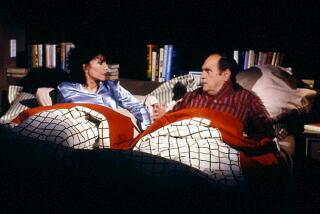Review: With ‘Horace and Pete,’ Louis C.K. drops a drama on the Internet
Unexpectedly and without notice, as if he were a pop star, Louis C.K. sent a drama out into the world Saturday, via his website, with the message, “Hi there. Horace and Pete Episode 1 is available for download. $5. We hope you like it.”
Written and directed by C.K. and shot multi-camera with long lenses in what might be called a variable proscenium-style, mostly on one set, “Horace and Pete” unfolds over the course of 67 minutes like a stage play, and seemingly in real time. Like Eugene O’Neill’s “The Iceman Cometh,” it takes place in a bar, one almost old enough to have contained the action of that play, which is set in 1912.
See more of Entertainment’s top stories on Facebook >>
Without going too much into what by the end of the first hour is already a much-progressed story, the bar is called Horace and Pete; Horace (C.K.) and Pete (Steve Buscemi) run it, with middling dedication, and live upstairs; also living upstairs is Horace’s ray-of-sunshine girlfriend (Rebecca Hall). There is an Uncle Pete (Alan Alda), a loose-mouthed collection of racist and sexist attitudes and generalized anger, who tends bar. There is a sister (Edie Falco), who is expected as the play – I automatically wrote “play” – begins; and a semi-estranged daughter for Horace (Aidy Bryant), who diagnoses him thusly: “You are not aware of anything; you look at a person’s face and if they’re smiling you’re fine and if they’re not then you’re sad.” (“Isn’t that normal?” he asks. “Yeah for a 5-year-old,” she replies, “but you’re 50.”)
The bar has its dug-in regulars, played by actors and comedians including Jessica Lange, Steven Wright, Kurt Metzger and Nick DiPaolo, whose conversations about life and the news allow a break from the messy family business unfolding elsewhere on the soundstage. (The episode is set on the eve of this year’s Iowa Caucus, with up-to-date references to Trump skipping the last debate, so if you watch it Sunday you’ll be chronologically in sync with the action; there is timely talk of the Super Bowl as well.)
Non-regulars also wander in – martini-seeking Brooklyn hipsters who marvel at the place’s age and decrepitude (“Oh my god, this is a total dive bar, this is amazing”) and are told by Uncle Pete that they don’t serve mixed drinks; Corona is grounds for eviction. That this is not the way to run a business in Brooklyn in 2016 is not irrelevant to the story.
Horace’s faltering attempts at connection, his frustrations and insecurities are similar to those of C.K.’s self-resembling character on his on-hiatus sitcom, “Louie,” and there are bits of this hour that could easily be worked into that show. Onstage, many of these lines would elicit laughter (as in a multi-camera comedy, you want to actually hear it); in “Louie” their comic thrust and weird angles would be easier to spot.
As in a stage play, the actors and the dialogue carry most of the weight; information is parceled out in bits, foreshadowing eventually explodes into revelation. (This hour is only the first episode of a number yet to be revealed; but it has a play-like arc on its own, and an “intermission” in the middle.) In some ways, it’s the opposite of “Louie,” which is careful with every element of its production, with its manipulations of time and mood, its photography and its music.
The production here emphasizes theatricality – you could play it, without alteration, onstage – just as its theatricality is likely what makes its production economically viable. (In television terms, what this most resembles is a soap opera.) But even at its most obvious or ungainly, it’s never less than interesting, and it’s certainly not shy of conviction; no C.K. fan with an Internet connection and $5 to spare will want to pass it by.
Follow Robert Lloyd on Twitter @LATimesTVLloyd
More to Read
The complete guide to home viewing
Get Screen Gab for everything about the TV shows and streaming movies everyone’s talking about.
You may occasionally receive promotional content from the Los Angeles Times.







